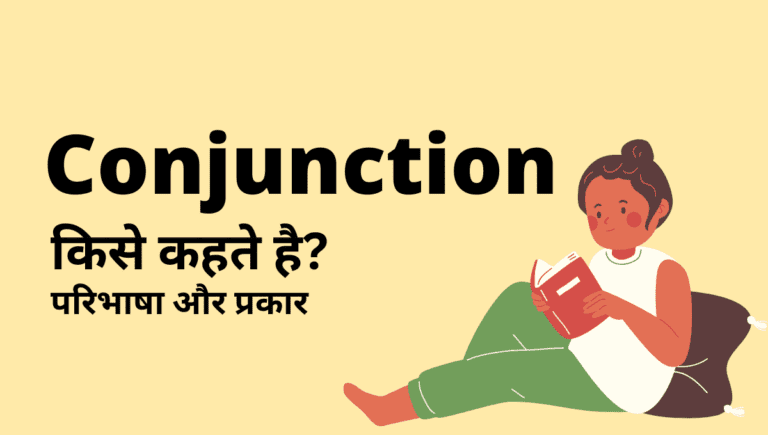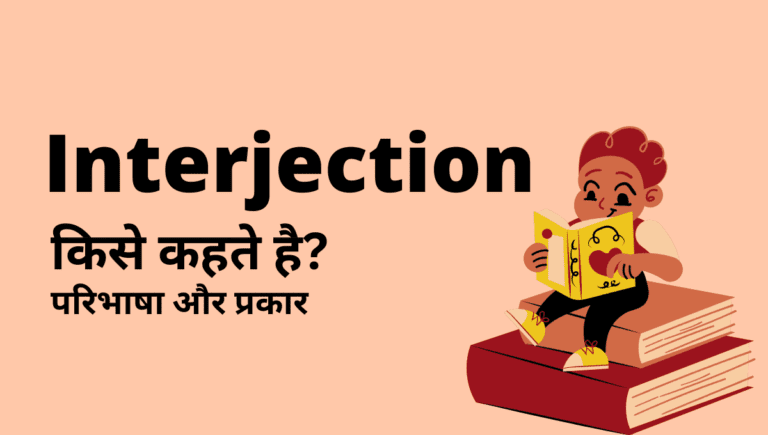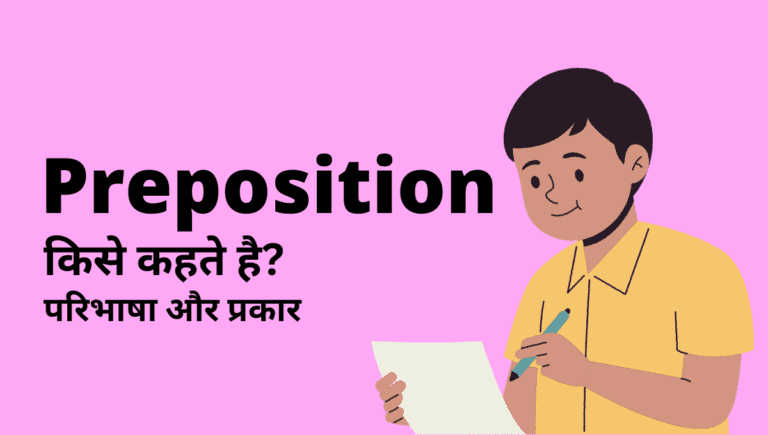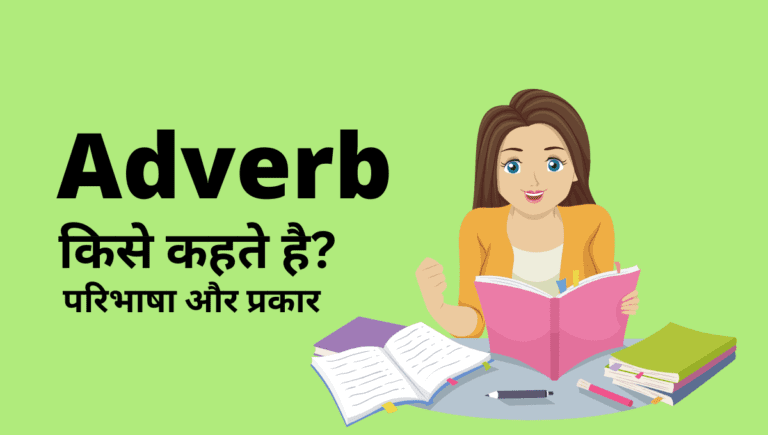इस पोस्ट (conjunction in Hindi) में हम conjunction यानि समुच्चयबोधक के बारे में जानेंगे। conjunction शब्दभेद (parts of speech) का हिस्सा है। यह इंग्लिश ग्रामर का एक महत्वपूर्ण टॉपिक है। जो की किसी वाक्य को बनाने में जरूरी होता है।
इस पोस्ट में हम conjunction को बहुत ही आसान भाषा में सीखेंगे। हम कंजंक्शन की परिभाषा (definition of conjunction), कंजंक्शन के प्रकार (types of conjunction) और कंजंक्शन के उदाहरण (conjunction examples in hindi) को अच्छे से समझेंगे।
Conjunction in Hindi
Conjunction definition in Hindi
समुच्चयबोधक कि परिभाषा – दो शब्दों अथवा दो वाक्यों को जोड़ने वाले शब्दों को समुच्चयबोधक (conjunction) कहते है।
Conjunction वाक्यों को संक्षिप्त (compact) बनाता है जिससे उन्हे पढ़ने और समझने में आसानी हो।
जैसे –
- Virat is a good batsman and Sachin is a good batsman.
- Virat is a good batsman. Sachin is a good batsman.
ऊपर दीए गए वाक्यों को संक्षित में conjunction की मदद से ऐसे लिखा जा सकता है-
Virat and Sachin are good batsman.
जहां and एक समुच्चयबोधक (conjunction) की तरह प्रयुक्त हुआ है।
समुच्चयबोधक के उदाहरण –
1.) Mahima and Akriti are in the same class.
1.) महिमा और आकृति एक ही कक्षा में हैं।
2.) I told him but he didn’t listen.
2.) मैंने उससे कहा लेकिन उसने नहीं सुना।
3.) The teacher scolds students for no reason.
3.) शिक्षक छात्रों को बिना किसी कारण के डांटता है।
4.) Either I need a laptop or a tablet.
4.) या तो मुझे लैपटॉप चाहिए या टैबलेट।
जैसे ऊपर दिए गए वाक्यों में and, but, for और either…or समुच्चयबोधक के उदाहरण है।
Conjunction meaning in Hindi
Conjunction का हिन्दी अर्थ होता है- “समुच्चयबोधक“।
Types/kinds of conjunction
समुच्चयबोधक को दो वर्गों/भागों मे बांटा जा सकता है:
- Coordinating conjunction (समानपदीय समुच्चयबोधक)
- Subordinating conjunction (आश्रितपदीय समुच्चयबोधक)
Coordinating conjunction
समानपदीय समुच्चयबोधक की परिभाषा – वे सभी समुच्चयबोधक जो समान कोटी अथवा समान महत्व के उपवाक्यों को साथ जोड़ते है, उन्हे समानपदीय समुच्चयबोधक (Coordinating conjunction) कहते है।
जैसे – For, also, nor, or, and, but, either…or, neither…nor, only, still आदि।
समानपदीय समुच्चयबोधक के उदाहरण –
1.) I am angry and needy sometimes.
1.) मैं कभी-कभी क्रोधित और जरूरतमंद होता हूं।
2.) You can win or lose the match.
2.) आप मैच जीत या हार सकते हैं।
3.) My friend is preparing for the IAS examination.
3.) मेरा मित्र आईएएस परीक्षा की तैयारी कर रहा है।
4.) They are hungry still they are still waiting for you.
4.) वे भूखे हैं फिर भी वे आपका इंतजार कर रहे हैं।
5.) She is a dancer but not a judge.
5.) वह एक डांसर है लेकिन जज नहीं है।
ऊपर दी गए वाक्यों में and, or, for, still और but समानपदीय समुच्चयबोधक के उदाहरण है।
Types of Coordinating conjunctions
समानपदीय समुच्चयबोधक चार प्रकार के होते है:
- Cumulative conjunctions (संयोजक या संचयी समुच्चयबोधक)
- Adversative conjunctions (विरोधक समुच्चयबोधक)
- Disjunctive/Alternative conjunctions (विभाजक या वेकल्पिक समुच्चयबोधक)
- Illative conjunctions (परिणामसूचक समुच्चयबोधक)
Cumulative conjunctions
संचयी समुच्चयबोधक की परिभाषा – वे समुच्चयबोधक जो केवल एक कथन को दूसरे कथन से जोड़ने का काम करते है, उन्हे संचयी समुच्चयबोधक (cumulative conjunctions) कहते है।
जैसे – As well as, and आदि।
संचयी समुच्चयबोधक के उदाहरण –
1.) Success demands hard work and discipline.
1.) सफलता कड़ी मेहनत और अनुशासन मांगती है।
2.) This person is intelligent and happy.
2.) यह व्यक्ति बुद्धिमान और खुशमिजाज होता है।
3.) He as well as his friend can’t speak about it.
3.) वह और उसका दोस्त इसके बारे में बात नहीं कर सकते।
4.) Me and my friends are enjoying a birthday party.
4.) मैं और मेरे दोस्त जन्मदिन की पार्टी का आनंद ले रहे हैं।
5.) Student and their teacher are in the class.
5.) छात्र और उनके शिक्षक कक्षा में हैं।
ऊपर दीए गए वाक्यों में and और as well as संचयी समुच्चयबोधक (cumulative conjunctions) के उदाहरण है।
Adversative conjunctions
विरोधक समुच्चयबोधक की परिभाषा – वे समुच्चयबोधक जो दो विरोधी कथनों को जोड़ने का काम करते है, उन्हे विरोधक समुच्चयबोधक (adversative conjunctions) कहते है।
जैसे – But, still, only, however, while, yet आदि।
विरोधक समुच्चयबोधक के उदाहरण –
1.) He is weird but helpful.
1.) वह अजीब है लेकिन मददगार है।
2.) I was hungry still I waited for you.
2.) मैं भूखा था फिर भी मैंने तुम्हारा इंतजार किया।
3.) Sneha is ill yet she came to school.
3.) स्नेहा बीमार है फिर भी वह स्कूल आई।
4.) She will come while we are going home.
4.) जब हम घर जा रहे होंगे तब वह आएगी।
5.) Mother is right only she is not speaking.
5.) माँ सही है केवल वह बोल नहीं रही है।
ऊपर दीए गए वाक्यों में but, still, yet, while, only विरोधक समुच्चयबोधक (adversative conjunctions) के उदाहरण है।
Alternative conjunctions
विभाजक या वेकल्पिक समुच्चयबोधक की परिभाषा – वे समुच्चयबोधक जो दो विकल्पों में से एक को चुनना व्यक्त करते है, उन्हे विभाजक समुच्चयबोधक (alternative conjunctions) कहते है।
जैसे – Or, othewise, either…or, neither…nor, else आदि।
विभाजक / वेकल्पिक समुच्चयबोधक के उदाहरण –
1.) You can play cricket or leave the ground.
1.) आप क्रिकेट खेल सकते हैं या मैदान छोड़ सकते हैं।
2.) Either Rahul is tired or doesn’t want to play.
2.) या तो राहुल थक गया है या खेलना नहीं चाहता।
3.) Neither I want to be a singer nor an actor.
3.) न तो मुझे सिंगर बनना है और न ही एक्टर।
4.) Be honest else you can’t be a good man.
4.) ईमानदार बनो वरना तुम एक अच्छे इंसान नहीं बन सकते।
5.) Study otherwise don’t sit with me.
5.) पढ़ाई करो वरना मेरे पास मत बैठो।
ऊपर दिए गए वाक्यों में or, either…or, neither…nor, else, otherwise विभाजक समुच्चयबोधक (alternative conjunctions) के उदाहरण है।
Illative conjunctions
परिणामसूचक समुच्चयबोधक की परिभाषा – वे समुच्चयबोधक जो परिणाम को व्यक्त करते है, उन्हे परिणामसूचक समुच्चयबोधक (illative conjunctions) कहते है।
जैसे – For, therefore, so आदि।
परिणामसूचक समुच्चयबोधक के उदाहरण –
1.) We are waiting for the party to begin.
1.) हम पार्टी शुरू होने का इंतजार कर रहे हैं।
2.) I came early so I can arrange the bike.
2.) मैं जल्दी आ गया ताकि मैं बाइक की व्यवस्था कर सकूँ।
3.) She is shy therefore she won’t talk to anyone.
3.) वह शर्मीली है इसलिए किसी से बात नहीं करती।
4.) Everyone is waiting for the food to serve.
4.) हर कोई भोजन परोसने का इंतजार कर रहा है।
5.) The teacher punished me so I won’t come tomorrow.
5.) शिक्षक ने मुझे दंडित किया इसलिए मैं कल नहीं आऊँगा।
ऊपर दीए गए वाक्यों में for, so, therfore परिणामसूचक समुच्चयबोधक (illative conjunctions) के उदाहरण है।
Subordinating conjunction
आश्रितपदीय समुच्चयबोधक की परिभाषा – वे समुच्चयबोधक जो एक उपवाक्य को उस दूसरे उपवाक्य से जोड़ते है जिस पर वह पूरे अर्थ को व्यक्त करने के लिए आश्रित होता है, उन्हे आश्रितपदीय समुच्चयबोधक (subordinating conjunction) कहते है।
जैसे – While, till, although, if, because, that, before, after, as, unless, though, where, when, than आदि।
आश्रितपदीय समुच्चयबोधक के उदाहरण –
1.) They can’t hear me because there is noise.
1.) शोर होने के कारण वे मुझे सुन नहीं सकते।
2.) If I were there I would attend the lecture.
2.) अगर मैं वहां होता तो मैं व्याख्यान में भाग लेता।
3.) Teachers know that the student didn’t complete homework.
3.) शिक्षक जानते हैं कि छात्र ने गृहकार्य पूरा नहीं किया।
4.) Write all the assignments before 6 O’clock.
4.) सभी असाइनमेंट 6 बजे से पहले लिख लें।
5.) When the sister calls him he is sleeping.
5.) जब बहन उसे बुलाती है तो वह सो रहा होता है।
ऊपर दिए गए वाक्यों में because, if, that, before और when आश्रितपदीय समुच्चयबोधक (subordinating conjunction) के उदाहरण है।
Types of subordinating conjunctions
अर्थ के आधार पर आश्रितपदीय समुच्चयबोधक को निम्नलिखत भागों में बांटा जा सकता है:
- Conjunction of time
- Conjunction of cause/reason
- Conjunction of purpose
- Conjunction of result or consequence
- Conjunction of condition
- Conjunction of concession
- Conjunction of comparison
Conjunction of time
परिभाषा – वे समुच्चयबोधक जो समय को बताने के लिए प्रयोग कीए जाते है, उन्हे (conjunction of time) कहते है।
जैसे – After, before, till, since, when, as long as, untill आदि।
उदाहरण –
1.) I came home after the movie.
1.) मैं मूवी के बाद घर आया।
2.) I am talking to you since morning.
2.) मैं आपसे सुबह से बात कर रहा हूं।
3.) Ask her till she accepts it.
3.) उससे तब तक पूछें जब तक वह इसे स्वीकार न कर ले।
4.) When I saw her she looks gorgeous.
4.) जब मैंने उसे देखा तो वह बहुत खूबसूरत लग रही थी।
ऊपर दीए गए वाक्यों में after, since, till और when, conjunction of time के उदाहरण है।
Conjunction of cause/reason
परिभाषा – वे समुच्चयबोधक जिनका उपयोग कारण बताने के लिए किया जाता है, उन्हे (conjunction of reason) कहते है।
जैसे – Since, as, because आदि।
उदाहरण –
1.) I can chat with friend because of Whatsapp.
1.) मैं व्हाट्सएप के कारण दोस्त के साथ चैट कर सकता हूं।
2.) You will get good marks since you studied.
2.) आपको अच्छे अंक मिलेंगे क्योंकि आपने पढ़ाई की है।
3.) She may agree as she is your friend.
3.) वह सहमत हो सकती है क्योंकि वह आपकी मित्र है।
4.) Class was started late because of the rain.
4.) बारिश की वजह से क्लास देर से शुरू हुई थी।
ऊपर दीए गए वाक्यों में because, since और as, conjunction of reason के उदाहरण है।
Conjunction of purpose
परिभाषा – वे समुच्चयबोधक जिनका उपयोग उद्देश्य बताने के लिए किया जाता है, उन्हे (conjunction of purpose) कहते है।
जैसे – That, so that, lest, in order to आदि।
उदाहरण –
1.) Tell him that I am good.
1.) उसे बताओ कि मैं अच्छा हूँ।
2.) Students go to school in order to learn.
2.) छात्र सीखने के लिए स्कूल जाते हैं।
3.) Climb carefully lest you get injured.
3.) ध्यान से चढ़ो ऐसा न हो कि तुम घायल हो जाओ।
4.) Tina talks to me so that she can understand.
4.) टीना मुझसे बात करती है ताकि वो समझ सके।
ऊपर दिए गए वाक्यों में that, in order to, lest और so that, conjunction of purpose के उदाहरण है।
Conjunction of result
परिभाषा – वे समुच्चयबोधक जिनका उपयोग परिणाम को बताने के लिए किया जाता है, उन्हे (conjunction of result) कहते है।
जैसे – That, such…that, so…that आदि।
उदाहरण –
1.) Rahul is so clever that he can easily pass the exam.
1.) राहुल इतना चतुर है कि वह आसानी से परीक्षा पास कर सकता है।
2.) The teacher is such skilled person that he can teach children easily.
2.) शिक्षक ऐसा कुशल व्यक्ति होता है जो बच्चों को आसानी से पढ़ा सकता है।
3.) We thought that he will learn English.
3.) हमने सोचा था कि वह अंग्रेजी सीखेगा।
4.) He practiced so hard that he can win the match.
4.) उसने इतना कठिन अभ्यास किया कि वह मैच जीत सके।
ऊपर दिए गए वाक्यों में so…that, such…that, that और so…that, conjunction of result के उदाहरण है।
Conjunction of condition
परिभाषा – वे समुच्चयबोधक जिनका उपयोग शर्त को बताने के लिए किया जाता है, उन्हे (conjunction of condition) कहते है।
जैसे – Only if, if, unless, as if, whether, provided आदि।
उदाहरण –
1.) They will go to the party if she invites.
1.) अगर वह आमंत्रित करती हैं तो वे पार्टी में जाएंगे।
2.) Whether I come to college or not I will study.
2.) मैं कॉलेज आऊं या न आऊं, पढ़ूंगा।
3.) Rina got angry as if Gorav scold at her.
3.) रीना को इस तरह गुस्सा आया जैसे गोरव ने उसे डांटा हो।
4.) You can’t buy expensive phone unless you earn well.
4.) जब तक आप अच्छी कमाई नहीं करते तब तक आप महंगा फोन नहीं खरीद सकते।
ऊपर दिए गए वाक्यों में if, whether, as if और unless, conjunction of condition के उदाहरण है।
Conjunction of concession
परिभाषा – वे समुच्चयबोधक जिनका उपयोग विरोध के भाव को बताने के लिए किया जाता है, उन्हे (conjunction of concession) कहते है।
जैसे – Though, although, even if आदि।
उदाहरण –
1.) I will help you even if you denied.
1.) अगर आपने इनकार किया तो भी मैं आपकी मदद करूंगा।
2.) He is not a good player though he is smart.
2.) वह चतुर होते हुए भी अच्छा खिलाड़ी नहीं है।
3.) The soldier keeps fighting although they are injured.
3.) घायल होने के बावजूद सैनिक लड़ते रहते हैं।
4.) My friend don’t have much money though he buy expensive stuff.
4.) मेरे दोस्त के पास ज्यादा पैसे नहीं है हालांकि वह महंगा सामान खरीदता है।
ऊपर दिए गए वाक्यों में even if, though और althought, conjunction of concession के उदाहरण है।
Conjunction of comparison
परिभाषा – वे समुच्चयबोधक जिनका उपयोग तुलना करने के लिए किया जाता है, उन्हे (conjunction of comparison) कहते है।
जैसे – Than, as आदि।
उदाहरण –
1.) This mobile is cheaper as that camera.
1.) यह मोबाइल उस कैमरे जितना सस्ता है।
2.) Rounak is as studied as I am.
2.) रौनक उतना ही पढ़ा लिखा है जितना मैं।
3.) This way is shorter than the other one.
3.) यह रास्ता दूसरे रास्ते से छोटा है।
4.) Mr. Gupta is richer than Mr. Sharma.
4.) मिस्टर गुप्ता, मिस्टर शर्मा से ज्यादा अमीर हैं।
ऊपर दिए गए वाक्यों में as और than, conjunction of comparison के उदाहरण है।
Conjunction examples in Hindi
Conjunction को अच्छे से समझने के लिए आप कंजंक्शन के और भी उदाहरण (conjunction examples in Hindi and English) नीचे देख सकते है:
1.) Bread and milk is wholesome food.
1.) रोटी और दूध पौष्टिक भोजन है।
2.) He wants to go home because he have headache.
2.) वह घर जाना चाहता है क्योंकि उसे सिरदर्द है।
3.) He is clever than me.
3.) वह मुझसे चतुर है।
4.) Since you agree, I believe it.
4.) चूंकि आप सहमत हैं, मुझे विश्वास है।
5.) Either you are right or I’m wrong.
5.) या तो आप सही हैं या मैं गलत।
6.) Catch the culprit if you smart.
6.) होशियार हो तो अपराधी को पकड़ो।
7.) Unless you tell me about it, I will keep asking.
7.) जब तक आप मुझे इसके बारे में नहीं बताएंगे, मैं पूछता रहूंगा।
8.) We should go their for his happiness.
8.) हमें उनकी खुशी के लिए जाना चाहिए।
9.) They can come by bus or train.
9.) वे बस या ट्रेन से आ सकते हैं।
10.) Think before you speak anything.
10.) कुछ भी बोलने से पहले सोचें।
ऊपर दिए गए वाक्यों में and, because, than, since, either…or, if, unless, for, or और before समुच्चयबोधक (conjunction) के उदाहरण है।
Conclusion
इस पोस्ट (conjunction in Hindi) में हमने conjunction के बारे में जाना हमें उम्मीद है, की आपको इस पोस्ट से सीखने को मिला होगा। आपको यह पोस्ट कैसी लगी हमें comment में जरूर बताए।
अंग्रेजी को आसानी से सीखने के लिए और फ्यूचर में ऐसी और भी पोस्ट पढ़ने के लिए हमारे इस blog को bookmark कर ले।
क्या आपने इन्हे पढ़ा?
Parts of Speech (शब्दभेद)





I’m not sure where you’re getting your info, but great topic.
Thanks